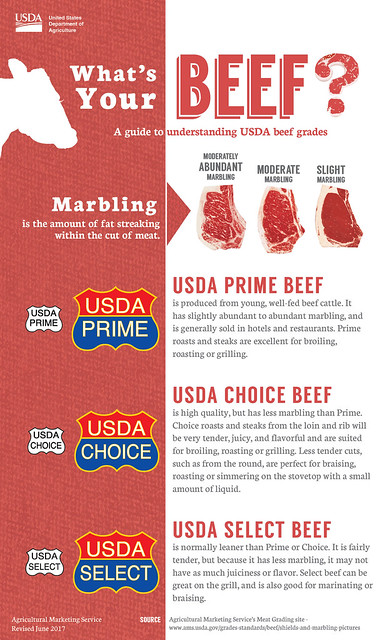
The USDA grade shields are highly regarded as symbols of safe, high-quality American beef. Quality grades are widely used as a "language" within the beef industry, making business transactions easier and providing a vital link to support rural America. Consumers, as well as those involved in the marketing of agricultural products, benefit from the greater efficiency permitted by the availability and application of grade standards.
Beef is evaluated by highly-skilled USDA meat graders using a subjective characteristic assessment process and electronic instruments to measure meat characteristics. These characteristics follow the official grade standards developed, maintained and interpreted by the USDA’s Agricultural Marketing Service.
Beef is graded in two ways: quality grades for tenderness, juiciness and flavor; and yield grades for the amount of usable lean meat on the carcass. From a consumer standpoint, what do these quality beef grades mean?
Prime beef is produced from young, well-fed beef cattle. It has abundant marbling (the amount of fat interspersed with lean meat), and is generally sold in restaurants and hotels. Prime roasts and steaks are excellent for dry-heat cooking such as broiling, roasting or grilling.
Choice beef is high quality, but has less marbling than Prime. Choice roasts and steaks from the loin and rib will be very tender, juicy, and flavorful and are suited for dry-heat cooking. Many of the less tender cuts can also be cooked with dry heat if not overcooked. Such cuts will be most tender if braised, roasted or simmered with a small amount of liquid in a tightly covered pan.
Select beef is very uniform in quality and normally leaner than the higher grades. It is fairly tender, but, because it has less marbling, it may lack some of the juiciness and flavor of the higher grades. Only the tender cuts should be cooked with dry heat. Other cuts should be marinated before cooking or braised to obtain maximum tenderness and flavor.
Standard and Commercial grades of beef are frequently sold as ungraded or as store brand meat. Utility, Cutter, and Canner grades of beef are seldom, if ever, sold at retail but are used instead to make ground beef and processed products.
Recently, USDA collaborated with the United States Meat Export Federation and Colorado State University to develop an educational video about the beef grading process. This video provides a comprehensive overview of the beef grading system – from farm to table.
So next time you are at a restaurant or grocery store, look for the USDA grade shield and you will better be able to answer the question, “What’s your beef?”
